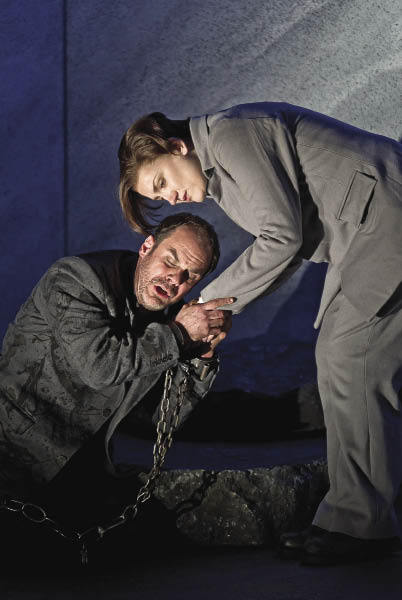Fidelio, once regarded as an uncomplicated celebration of what its title suggests, and of freedom, especially political freedom, has become a problem work, and most productions of it amount to uninterestingly complicated attempts to circumvent issues which shouldn’t have been present in the director’s mind in the first place.
Fidelio, once regarded as an uncomplicated celebration of what its title suggests, and of freedom, especially political freedom, has become a problem work, and most productions of it amount to uninterestingly complicated attempts to circumvent issues which shouldn’t have been present in the director’s mind in the first place. This has been a bad season, until Opera North broke the spell by mounting Tim Albery’s production, first seen in Scotland in 1994.
Last September, Welsh National Opera put on a production which was in every respect a simple disaster. Last month the Royal Opera managed a more elaborate but hardly less depressing mess. Albery, however, sees no problems in the work, and stages it simply and with conviction, a conviction clearly shared by the conductor, Richard Armstrong, who on the second night (I believe there was a lighting failure on the first night) ripped into the work with loving abandon. He negotiated beautifully the transition between the buffo opening two numbers and the sublime canon quartet, whisked lightly through Rocco’s gold aria, and then built the tension unremittingly from the great heroic trio through to the prisoners’ return to darkness, and Rocco and Leonore’s descent to the depths, a First Act which left me thrilled in the same way as Klemperer’s used to, if not to the same degree. Armstrong’s attack and pacing in Act II were just as convincing, making this the most stirring stage performance of Fidelio for many years.
Most of the singing is of a high standard, too, with Emma Bell a convincing heroine, tall, lean, slightly awkward in her movements and, with the exception of a very few notes, secure in singing some of Beethoven’s most moving but, for the singer, cruellest music. The object of her efforts, whose past relations with the villain Pizarro we remain largely in the dark about, is the young American Steven Harrison, who sang most of Florestan’s aria movingly, but seemed to suffer a brief vocal collapse during the difficult ‘vision’ music, and hardly did more than speak it. He revived for the rest of the opera, though I suspect heroic roles are not his destiny.
The rest of the cast acquitted themselves well, though Albery’s conception of Don Pizarro — the action is set in the present, so the villain is plausibly portrayed as a stiff-jointed tense office boss, no doubt writing vicious appraisals of his employees — makes it difficult for Andrew Foster-Williams to know quite how to sing his bombastic music. But that is a difficulty for any Pizarro.
The production, though it serves the work strikingly, has its oddities. Marzelline is first seen ironing in a tiny bare room with her equally austere bedroom overhead. Gradually the set expands, but the claustrophobia of the opening is never lost, except when, at a few points where hope is invoked or even justified, we see a Caspar David Friedrich landscape. Yet at the very end, where the performance is delirious with joy, Leonore and Florestan escape to a world of high-rises and urban bleakness; it would be interesting to know if they retain their high spirits in the face of that more ubiquitous tyranny.
At the Barbican Debussy’s Pelléas et Mélisande had a single concert performance, presented in association with the Théâtre des Champs-Élysées. The last time I saw this opera was at the Royal Opera in a production so hateful that it virtually turned me against the work itself. This Barbican event was the perfect remedy for that, and I imagine that anyone present will regard it as one of the operatic experiences of a lifetime.
With the superb Orchestre de Paris onstage, one could hear innumerable moving details, but more important was the sheer power and passion of the playing, as, too, of all the performers; Louis Langrée, the conductor, is no doubt largely responsible for the devastating success of the occasion. Without indulging in late-Karajan lushness, he nonetheless banished any thoughts of half-colours, velleities and the other terms that are routinely used to characterise this masterpiece. He was working with a perfect cast, too.
Natalie Dessay, an apparently faultless artist, delivered Mélisande’s often puzzling lines with exactly the right kind of evasiveness, while retaining a ravishing sound throughout. Simon Keenlyside as Pelléas, in the role he was born, above all others, to sing, gave a reading of nearly unbearable intensity, nobility and warmth, turning a character who often comes across as insipid into one of opera’s most fascinating figures, and using a voice which at full throttle made an immense impact. All horrible memories of his involvement in that ghastly Royal Opera massacre were banished.
And Laurent Naouri’s Golaud made the whole thing even more agonising because his Golaud was so intent on doing the right thing and so lost about what that might be. Alain Vernhes sang Arkel’s music more beautifully than anyone I have ever heard, leaving one feeling that, however tiresomely sententious what this character says may be, Debussy does give him every chance.
An elusive work, a definitive account — that is a paradox, nearly, but one that this unforgettable occasion compels me to produce.






Comments